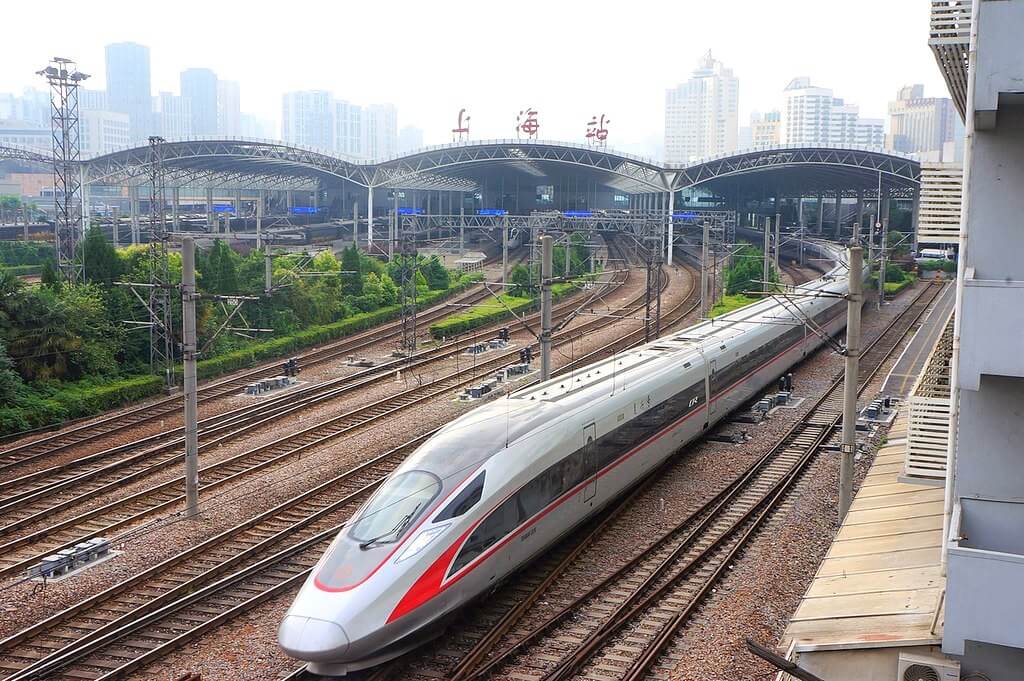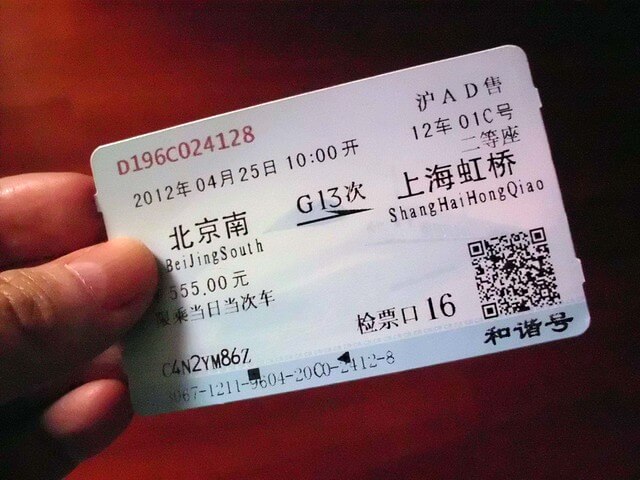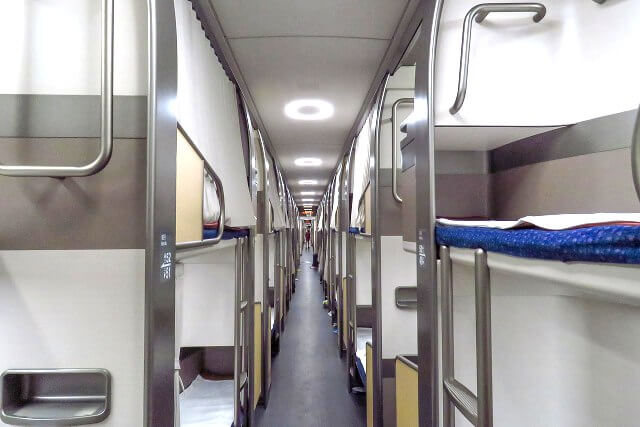Traveling on the Beijing to Shanghai train is the quickest and most cost-efficient way to get between these two iconic mega-cities. Because China’s high-speed trains operate at a speed of 350 km/hr, you can travel 819 miles within 4.5 hours.
While this is of course longer than the time it takes to fly (2 hours), there are many perks to train travel, including easier security, the convenient location of stations, comfort of travel, and cheaper cost of ticket.
And, when you consider getting to the airport at least an hour before your flight, and the time it takes you to disembark, collect your bags, and then catch a taxi, train travel actually ends up being around the same amount of time.
So, you’ve decided the book the train between Beijing and Shanghai. What else do you need to know?
How to Get From Beijing to Shanghai by Train
About the Route

Image: MNXANL [CC BY-SA 4.0] via Wikimedia Commons
The railway between Beijing and Shanghai is called Jinghu Railway, and this is one of the busiest rail lines in the country. On route to Shanghai you’ll pass through major cities Tianjin, Jinan, Nanjing and Suzhou, and arrive in Shanghai within 4 – 6 hours, depending on the train you’ve chosen.
There are 40 high speed bullet trains that run during the day. Trains that operate during the day are called G-category trains, and trains that run overnight are called D-category trains.
There are three stations in each city, so it’s important to check that you’re arriving at the right one, though almost all Beijing-Shanghai day routes start at Beijing South Station (BeijingNan). A couple of overnight sleeper trains still use Beijing’s main central station.
Likewise, almost all trains now arrive at Shanghai’s new Hongqiao station, which is around 18 km out of the city center. If you’re catching an overnight sleeper train though, check your arrival station as you may be training into Shanghai’s main station (Shanghai Zhan).
High speed trains in China are efficient, and almost never get delayed, unlike flights, where you have a 10 – 20% chance of being delayed by at least 1-3 hours.
Train Tickets

Image: Mr Thinktank (CC BY 2.0) via Flickr
Cost wise, train tickets from Beijing to Shanghai can cost anywhere between $79 USD – $250 USD. The trains start from 7 AM and depart multiple times each hour through until 7 pm.
The ticket prices will vary based on the class you purchase. The trains are usually broken up into first, second, and business class is available. Each of them offers a similar level of comfort, inclusions and amenities.
The main thing to remember is to get the “G” train, which refers to all of the high-speed trains that are in transit. If you’re hoping to travel by overnight train, there’s usually that option too.
It’s easy to buy tickets in person at the station, though trains in China are usually fully booked, so it’s better to buy tickets online, which you can do through any reliable train ticketing agency. Tickets open 60 days before the departure date, and you pick them up from the station.
If you’re traveling with kids, children’s tickets are 50% off for day time seats, or 75% off for sleepers. These discounts only apply to kids younger than 12 years of age.
Traveling on Overnight Sleeper Trains

N509FZ [CC BY-SA 4.0] via Wikimedia Commons
If you’re on a tight budget and speed isn’t the main issue, taking a 12-hour overnight train is a great way to travel from Beijing to Shanghai. And in doing so, you save yourself the cost of a night’s accommodation.
You can choose between the bullet trains or the slower normal trains for overnight journeys. Sleeper trains depart during the evening and you can have a private bunk to rest throughout the journey.
There are options for soft sleepers or hard sleepers when booking sleeper train tickets. Soft sleepers are comfortable, private, and come with pillows, sheets and blankets. Hard sleepers mean having to sit in a chair for the whole journey.
There are 4-5 different options for booking the sleeper train; the Z281 leaves Beijing at 7 pm, and arrives in Shanghai at 10 am; the T109 leaves at 8 pm and gets in at 11 am; the D701 leaves at 7.22 pm and gets in at 7.25 am; the D705 leaves at 9.20 pm and gets in at 9.20 am.
Keep in mind though that arriving in the morning means you’ll be in Shanghai well before hotel check-in time, but most hotels will store your luggage until then.
If you’re taking the sleeper train option, we recommend buying your tickets in advance. Sometimes, both the hard sleeper and soft sleeper tickets are sold out a full week in advance.
Onboard Logistics

Image: shankar s. (CC BY 2.0) via Flickr
You’re typically allowed a maximum of 20 kg of luggage per adult when you travel on the Beijing – Shanghai trains, though it’s rare that luggage limits are enforced. It’s hit or miss whether you’ll have a power socket / USB port – some trains do, some trains don’t.
All trains have free WiFi, though you’ll need a local SIM card to be able to access it via a code they text you for access. If you’re wanting to access blocked sites like Facebook, Twitter and Google in China you’ll need to use a VPN.
Food is available on trains, and they also allow BYO. If you’re planning on buying food there make sure you have cash as they don’t commonly accept credit cards. Business class tickets include food, while regular tickets do not.
OUR FAVORITE CHINA GUIDES: CLICK TO LOOK INSIDE ↓

|









